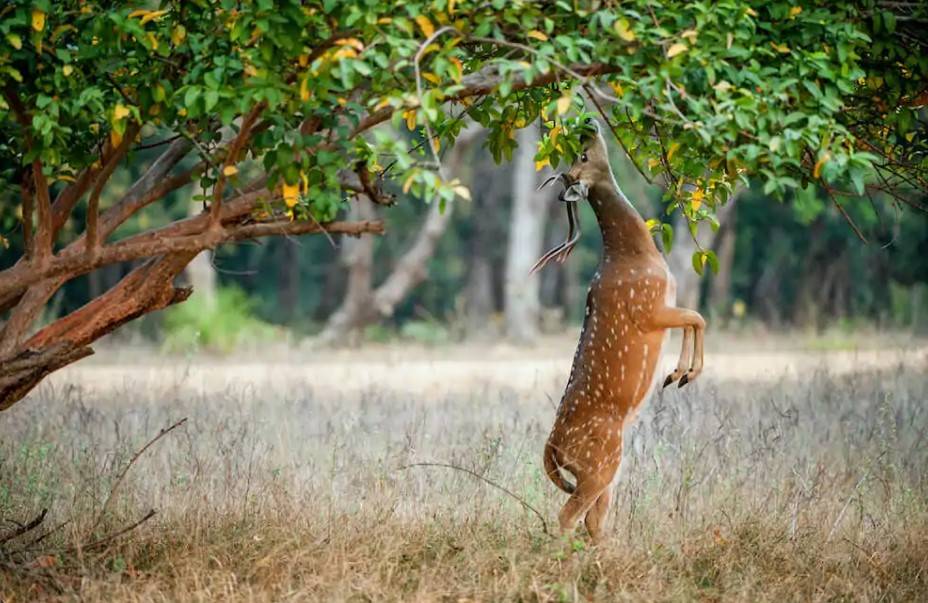When you’ve laboriously nurtured your garden into a citrus paradise, the last thing you want is deer treating it as a buffet. The question at hand: Do deer eat lemon trees? This article aims to shed light on deer dietary preferences, focusing particularly on their potential for lemon tree consumption.

Table of Contents
Do deer eat lemon trees?
Deer won’t eat lemon trees if there are other options to choose from. They need to eat around 6-8% of their body weight with a balanced combination of lush, green foliage and browse to stay healthy, agile and alert.
So larger fruits aren’t really what they are interested in.
Of course, they will eat lemon trees if they can’t find anything else to nibble on. Their real value is in the softer, more tender tree shoots where the fruits will eventually sprout from.
So technically, they can go for lemon trees but not the actual lemons. Deer generally go for smaller fruit/nut options, such as berries, apples, persimmons, pecans, acorns and rose heads.
How Can Deer Ruin Your Plant?
Deer can cause a range of different issues to lemon trees. They often come out to feed at night when they can get around without being easily spotted. How they can cause some real damage are:

- Munching away at shoots, flower buds and foliage, stripping them of almost everything. The twiggy ends often with jagged cuts as the smaller nodes are ripped off with force.
- Other trees, shrubs and plants in the area are trampled on and squished as these not-so-graceful beasts move around.
- Male deers tend to fray the younger trees. This is where they rub the bark of the main trunk and stems, causing it to hang off in tatters. They also thrash around woody plants and branches with their antlers, whipping other trees in the near vicinity. The damage can be quite noticeable as they are forceful in their actions.
- The bark can also be removed and eaten in the colder months when sprouting plants/trees become scarce.
How to Protect Lemon Trees from Deer?
There are some pretty handy methods that you can use to give your lemon trees a little bit of extra protection from these ever-curious mammals.
Some are more forceful, and others can be subtle or preplanned. Let’s look at some different techniques and how you can implement them.

Repellents
The most useful repellents for deer are either anything that has the scent of a human or something that a human may use. They tend to get spooked when a foreign aroma hits their nostrils.
Things such as used soap (we’ll look into that further down), stinky egg and spoiled milk mixtures, vinegar and herbal essential oils blends. There is store bought repellents as well.
You can make some pretty effective repellents at home with some staple ingredients. These alternatives are more natural and a bit better for the environment.
Sprays
Repellents can be made into spray form, easily applied to your lemon trees. If you want to make your own, here are some simple recipes:
Egg and spoiled milk deer repellent:
- Beat 1 egg and add to a 16-ounce spray bottle.
- Add 1 tbs cooking oil, 1 tbs dish soap, and 1/2 cup milk to the bottle.
- Fill halfway with water, close the lid and shake until contents are mixed.
- Spray around the garden away from anything you don’t want to stink.
- Store spray in the fridge until required.
Vinegar and herbal essential oils deer repellent:
- Add 8 oz white vinegar to a 16 oz spray bottle.
- Add 6 drops of peppermint essential oil and 4 drops of rosemary essential oil to the vinegar.
- Shake contents to mix.
- Spray on lemon trees, refraining from spraying anything you plan to eat.
There are, of course, store-bought repellents which can contain some not-so-natural ingredients. We find that the homemade variants work just as well, if not better.
Whatever the type, they usually contain unpleasant smells or tastes or a mixture of both.
A couple of decent quality premixed solutions include liquid fence and angry deer.
Using a physical distraction
Another deterrent for deer can be using specific items with a scarecrow-like effect. You can hang old compact disks (CDs) up using a fishing line so that the light spins and shines around, making the area less inviting. The fishing line can also be wrapped around the lemon tree a few feet off the ground. The deer get confused and flee.
Using plastic bags tied together, you can create bag socks, so the wind thrashes them around. You may even have wind chimes or bells that can spook a deer.
We’ve even tested out stacking a heap of old rubbish shipping pellets up around your lemon trees to act as a physical barrier. Being created is the key.
Motion detected speakers
There is a range of different types of motion detectors with speakers. Some play solar ultrasonic sounds, such as the Pestguru. Others like this Duranom can be turned into an FM radio and play extremely loud music, amongst other sounds.
The choices are plenty; the bottom line is that deers are generally always on high alert. It’s in their nature, so speakers that blast out tones and sound when picking up motion will always be an issue for a careful deer.
Fencing
Fencing can come in many different forms. You can build proper deer-proof chain mesh. This type can be costly but almost deer-proof. Then there’s the more natural approach of using hedging or strategically planted trees that don’t allow a deer to get near your guarded lemon trees.
As mentioned a bit higher up, you can create ‘fencing’ in the form of barriers with old pellets and other sturdy debris. The ideal height is 8 ft, and the fencing gaps shouldn’t be any wider than 6 inches X 6 inches if possible.
Guard Dog
There’s nothing like a yelping, panting guard dog sitting in your yard watching over your lemon trees. The odd scent of a dog alone will throw a deer off its foraging mission. They ain’t called guard dogs for no reason. Having your K-9 around will keep any pesky little deers away.
Deer-Resistant Plants
As deer rely heavily on their sense of smell, using strong-smelling herbs or flowers to mask the scent of their favorites is a simple but effective method. Garlic, chives, mint, lavender and rosemary are great at helping to achieve this.
After redirecting their smell, deer’s sense of touch can also be messed with in a ‘friendly’ manner. Try adding some prickly, thorny or hairy foliage close to your lemon trees to help make the intruders feel uncomfortable when munching away. Lamb’s ear, barberries, scotch or rugosa roses and cleome are great options for this purpose.
Soap Bars
Deer doesn’t like the smell of soap, from bars to granules and liquid. Soap bars, though, are really handy as they are cheap and can be made to hang on trees or bushes with string.
Just drill a hole in the center of the bar and tie it off with string. It’s a well-known strategy often used in 10-15 foot intervals around a property for full effect.

Prune lower branches
Pruning lower branches is another option, although more of a last resort. The issue with this is losing those lower growth areas in the beginning.
As a long-term prospect, though, this method can be quite beneficial. The deer won’t be able to reach, and they are smart enough not to come back for more if they know there isn’t anything to return to.
Frequently Asked Questions (FAQs)
1. Are lemons dangerous for deer to eat? (h3)
Lemons are fine for deers to eat regarding how their system can break them down. They can rip them off and fill their gullet with sour lemon juice. In saying that, they aren’t too interested in anything with an aromatic stench, though. But, they can eat them if nothing else is available.
2. Do wind chimes keep deer away?
Deers are easily spooked. Anything that makes abnormal sounds, movements and altered lighting can drive them away. Wind chimes are no different. Better still, strategically placed wind chimes can be a super effective deterrent. If you can scatter them around, so they chime in random intervals, a deer won’t hang around for too long to find out what it is making the noise.
Conclusion:
So as we have just confirmed, deers eat lemon trees but not specifically for the lemons. They go for the smaller buds and tastier woody branches and stems. They thrash about while feeding and can make quite a mess of your lemon trees.
If there is no other food source, they will only consider eating the lemons. There are a range of ways you can scare them away if you’re well prepared. We hope that this article has been helpful. Happy growing


